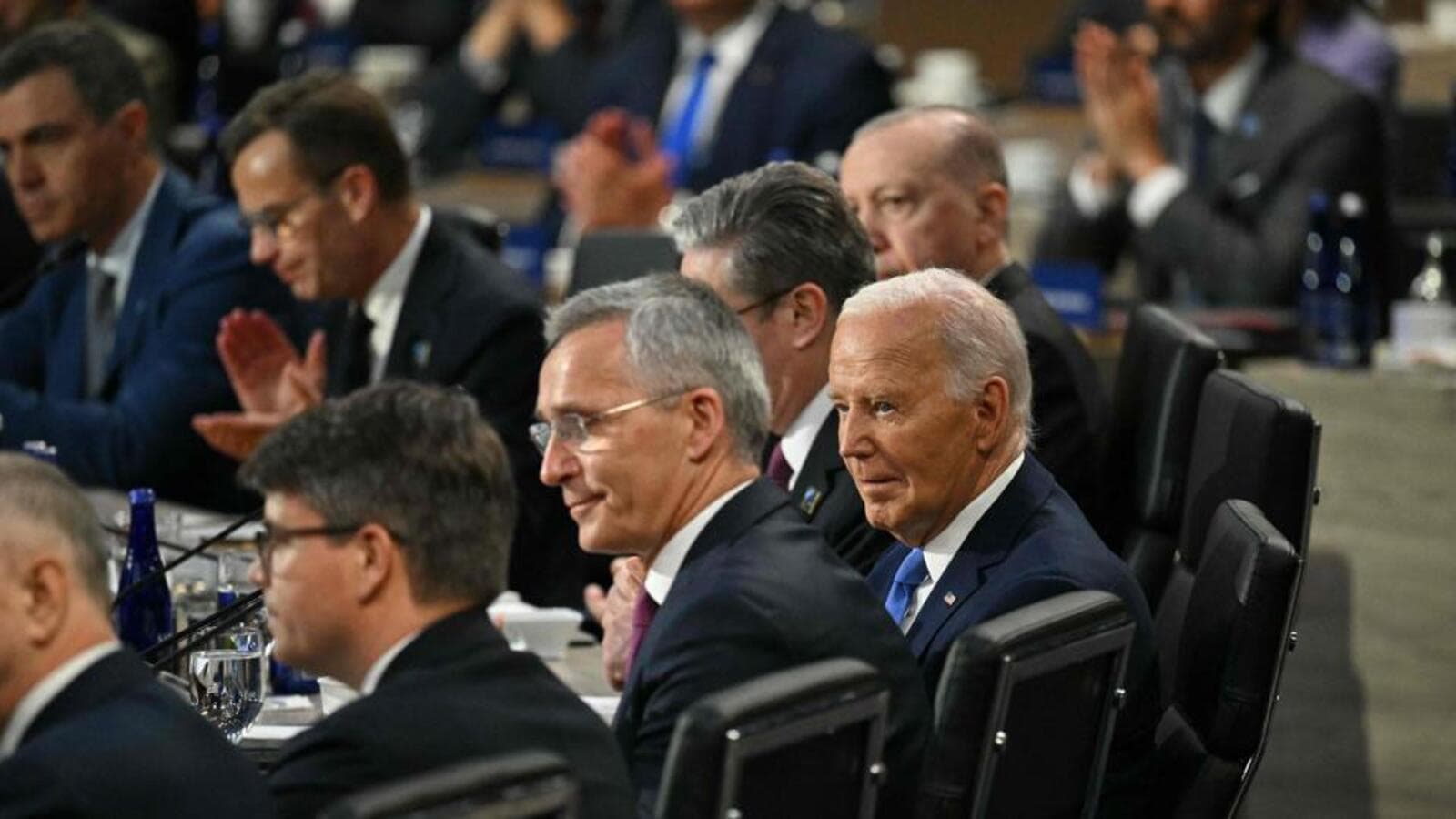World
Stop enabling Ukraine war or face consequences, Nato warns China

Washington: In its most explicit and elaborate reference to China ever, the North Atlantic Treaty Organisation (Nato) has called Beijing the “decisive enabler” of Russia’s war against Ukraine and warned China that unless it “ceases all political and material support” to Russia’s war effort, there will be a “negative impact” on Beijing’s interests and reputation.
The Washington Summit Declaration, issued at Nato’s milestone 75th anniversary meeting in the US capital, strongly reiterated the importance of the Trans-Atlantic military alliance in the backdrop of internal political challenges and external strategic challenges. It also rolled out a set of new announcements to support Ukraine, and slammed Moscow for its continued aggression.
But the declaration stood out for its emphasis on China, yet another sign that the Moscow-Beijing alliance has, in the West’s perspective, led to an increasing fusion of the European and Indo-Pacific theatres. The closer China-Russia partnership is also a matter of keen interest to India, and Prime Minister Narendra Modi’s recent Moscow visit was seen, among other factors, as driven by the need to engage with Russia to ensure that its new partnership doesn’t erode its older partnership in the context of India-China tensions.
At the outset of the declaration, Nato countries categorically stated, “The People’s Republic of China’s (PRC) stated ambitions and coercive policies continue to challenge our interests, security and values. The deepening strategic partnership between Russia and the PRC and their mutually reinforcing attempts to undercut and reshape the rules-based international order, are a cause for profound concern.”
Later in the text, while holding Russia “solely responsible” for the war in Ukraine, the Washington declaration says, “The PRC has become a decisive enabler of Russia’s war against Ukraine through its so-called ‘no limits’ partnership and its large-scale support for Russia’s defence industrial base. This increases the threat Russia poses to its neighbours and to Euro-Atlantic security.”
Calling on China as a responsible member of the UN Security Council to cease all support to Russia, the declaration specifically says, “This includes the transfer of dual-use materials, such as weapons components, equipment, and raw materials that serve as inputs for Russia’s defence sector. The PRC cannot enable the largest war in Europe in recent history without this negatively impacting its interests and reputation.”
Over the past six months, top US officials — including Secretary of State Antony J Blinken and the head of the American intelligence apparatus Avril Haines — have said that China’s support played a key role in changing battleground dynamics in Ukraine and gave Moscow a fillip. The US has also sanctioned Chinese entities exporting dual use material to Russia.
In a sign of the evolution of the US-led Nato alliance, a grouping of 32 members founded in 1949 to counter the Soviet Union, and the blurring of traditional geopolitical boundaries, the declaration says that China poses “systemic challenges to Euro-Atlantic security” and then outlines the specific ways in which China’s behaviour is disruptive.
“We have seen sustained malicious cyber and hybrid activities, including disinformation, stemming from the PRC…We are concerned by developments in the PRC’s space capabilities and activities…The PRC continues to rapidly expand and diversify its nuclear arsenal with more warheads and a larger number of sophisticated delivery systems….”, the declaration states.
In this backdrop, Nato has asked China to uphold its commitment to act responsibly in cyberspace, to promote responsible space behaviour, and to engage in strategic risk reduction talks. While saying that the alliance remains open to constructive engagement with China, the declaration warns, “We are boosting our shared awareness, enhancing our resilience and preparedness, and protecting against the PRC’s coercive tactics and efforts to divide the Alliance.”
The declaration also recognised the presence of leaders of Australia, New Zealand, Japan and South Korea at the summit; this is the third year in a row that America’s treaty allies in the Indo-Pacific have attended a Nato summit, an outcome that is seen as directly linked to the China-Russia no limits partnership announced in February 2022. Japan’s PM Fumio Kishida, in an address to the US Congress earlier this year, warned that China was closely watching the war in Ukraine and what was happening in Europe today could happen in Asia tomorrow.
“The Indo-Pacific is important for Nato, given that developments in that region directly affect Euro-Atlantic security. We welcome the continued contributions of our Asia-Pacific partners to Euro-Atlantic security. We are strengthening dialogue to tackle cross-regional challenges and are enhancing our practical cooperation,” the declaration said. It added that the specific areas of cooperation included supporting Ukraine, cyber defence, countering disinformation and technology.
On Thursday, US President Joe Biden met the leaders of Indo-Pacific countries who had travelled to DC for the summit. In a statement, the White House said that leaders had “discussed the increasing connectivity between Euro-Atlantic and Indo-Pacific security, noting that challenges in one region affect the other”.
Biden welcomed the “courageous support” to Ukraine offered by Nato’s Indo-Pacific partners. The leaders also condemned both North Korea and China’s support to Russia.







:max_bytes(150000):strip_icc()/roundup-writereditor-loved-deals-tout-f5de51f85de145b2b1eb99cdb7b6cb84.jpg)


